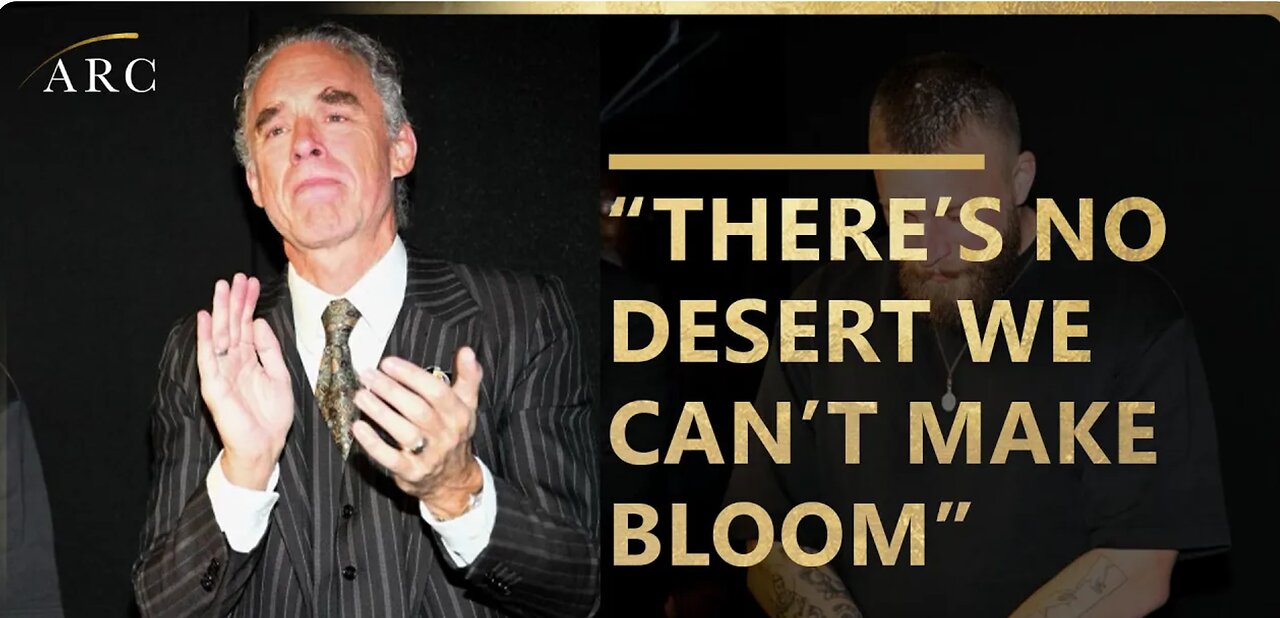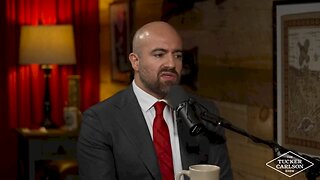Premium Only Content

Jordan Peterson at ARC
he good news
Life has improved dramatically, over the past few centuries, for almost everyone, everywhere,
at an ever-accelerating rate. Far more people are thriving on our planet than we could have
imagined even mere decades ago. We live longer, are increasingly and globally literate,
educated, and connected, and enjoy unparalleled access to fresh water, food, energy and
resources.
We exist, as well, in comparative peace: violence of every form, from murder to insurrection, is
increasingly rare and universally condemned, and fewer people than ever before confront the
ravages of war. To note that all this is a miracle is to still understate the enormity of the
accomplishment.
Many problems, of course, remain: hundreds of millions still labour under conditions of
extreme privation; we still organize ourselves less effectively than we might if we were truly
wise; we are still determining how to maintain our economic security and prosperity in an
efficient, cost-effective, and nature-conserving manner.
But the foundations are secure and good: we have learned how to act and to conduct ourselves
both individually and socially so that true human flourishing is possible, on a scale heretofore
undreamed of and practically impossible.
The challenge
Despite all this good news, this undeniable progress, a shadow has emerged, an adversarial
challenge to this state and process of expanding abundance; an emergent crisis of meaning and
purpose. God is dead, or so the story goes, and the future is uncertain. Five centuries of
ascendant reductionist Enlightenment rationality have revealed that this starkly objective world
lacks all intrinsic meaning. A century and a half or more of corrosive cultural criticism has
undermined our understanding of and faith in the traditions necessary to unite and guide us.
In the midst of this existential chaos, the false idol of apocalyptic ideology inevitably beckons.
We find ourselves, in consequence, inundated by a continual onslaught of ominous,
demoralizing messages, most particularly in the form of environmental catastrophism; the
insistence that we confront a severe and immediately pending emergency of biological
destruction, causally associated with our degenerate social structures and their excess and
destructive industrial production.
The narrative generating these messages, quasi-religious in its structure and intensity, paints a
dismal existential picture: the individual is a rapacious, predatory, parasitical consumer;
society—even the little society of the family—an oppressive, tyrannical despoiler; and nature,
herself, a hapless, fragile, virginal victim.
3
For our sins, so the story goes, the horsemen of the apocalypse are to be loosed upon us—and
justly so. The ultimate Malthusian nightmare is about to be realized: the planet is unsustainably
and unforgivably overpopulated; there is simply too much fundamentally pathological human
activity; plague, political anarchy and starvation await us all. It is, in consequence, high time to
repent, and change our errant ways; to admit in defeated shame that our current social and
industrial enterprises are corrupt and unsustainable; to radically revolutionize all traditional
forms of conduct and governance; to question even the propriety of bringing new devouring
mouths into this world; to accept, without resistance, the limits to growth and opportunity
made increasingly mandatory by a coterie of concerned and hypothetically expert elites.
A deep, worldwide, social, economic and environmental revolution is therefore allegedly at
hand; those who dare suggest otherwise are blind, if not malevolent, and must be silenced.
The results of such theories? The consequences of such proclamations?
The increasing and increasingly compelled imposition of severe, involuntary limits to material
abundance and growth; the resultant artificially-inflated prices, particularly for energy, that
most truly punish the poor.
The fraying of our social fabric into a chaos of alienated polarization; simultaneously, and in
predictable lockstep, the extension of reach and control over even the most private details of
our lives by increasingly gigantic and centralized organizations, governmental and corporate
alike.
The spread, particularly among the young, of a demoralizing and socially-divisive doubt and
hopelessness.
Invitation to the ARC
The catastrophizing must stop. It is existentially perilous to insist upon the impending end of
the world in this doomsaying manner—lest the ensuing panicked tyranny produce exactly the
result that is, in principle, most feared. The use of increasingly powerful and invasive
technology to monitor and control everything, in combination with the willingness and ability to
use compulsion and force, can lead only to tyranny and despair, regardless of the hypothetical
nobility of the end goal.
We have improved almost everything, and appear to be rapidly getting better at doing precisely
that. As the great British historian Macaulay long ago inquired: “On what principle is it, that
when we see nothing but improvement behind us, we are to expect nothing but deterioration
before us?”
We have therefore initiated the Alliance for Responsible Citizenship (ARC), a new movement of
hopeful vision, local, national and international in its aim and scope, aimed at the collective,
voluntary establishment of a maximally attractive route forward. The ARC will open itself up to
widespread public membership, as rapidly and extensively as is practically manageable, at as
4
low a cost as is possible and desirable, so that everyone interested can aid in voluntarily
formulating this story and strategy, and to discuss how its implementation might be
encouraged.
We are also announcing our first conference, slated for Greenwich, London, England, October
30th and 31st and November 1st, concentrating on issues metaphysical, cultural and practical.
Some of this conference will be necessarily limited in its scale to two thousand initial attendees;
some of it will be made open to a wide a swathe of the public; the happenings on both fronts
will be made available online insofar as that is pragmatically possible, either live or recorded for
later reading, viewing or listening.
We plan to render the operations of the ARC public and transparent; to operate under the
assumption that each citizen has the inalienable right and is well-equipped when engaged,
informed and consulted to choose and adhere to the desirable, sustainable, productive and
generous future path.
The sheer complexity of the world, and the genuine diversity of individual ability and
preference means that distributed decision-making is a necessity, not a luxury: no elite
technocracy is capable of knowing best and then determining how we should all move forward
as individuals and communities.
It follows from this that policy requiring compulsion, let alone force, rather than the voluntary
assent of the participants, is bad policy.
We offer for the contemplation of those potentially interested in our invitation six fundamental
questions, the answers to which might form the basis for a vision that is voluntarily compelling,
motivating, stabilizing and uniting.
• Vision and Story: What destiny might we envision and pursue, such that we are
maximally fortified against anxiety and despair, motivated by faith and hope, and
voluntarily united in our pursuit of a flourishing and abundant world?
• Responsible Citizenship: How might we encourage individuals to reflect and to act so
that they adopt full voluntary responsibility for themselves, present and future, as well
as their families and communities?
• Family and Social Fabric: How might we effectively conceptualize, value and reward the
sacrificial, long-term, peaceful, child-centered intimate relationships upon which
psychological integrity and social stability most fundamentally depend?
• Free Exchange and Good Governance: How can we continue to gain from the genius of
unbridled human innovation and the productive reciprocity of voluntary production and
free exchange, while protecting ourselves against the tendency of successful
organizations to degenerate into a state of wilfully blind and narrowly self-serving
authoritarianism?
5
• Energy and Resources: How do we ensure provision of the energy and other resources
crucial to our shared security and opportunity in a manner that is inexpensive, reliable,
safe, efficient and widely and universally accessible?
• Environmental Stewardship: How might we properly pursue the environmental
stewardship that most truly serves the needs and wants of all individuals today,
tomorrow and into the foreseeable future?
Concluding words
We at ARC do not believe that humanity is necessarily and inevitably teetering on the brink of
apocalyptic disaster. We do not believe that we are beings primarily motivated by lust for
power and desire to dominate. We do not regard ourselves or our fellow citizens as destructive
forces, living in an alien relationship to the pristine and pure natural world.
We posit, instead, that men and women of faith and decisiveness, made in the image of God,
can arrange their affairs with care and attention so that abundance and opportunity could be
available for all.
Those who present a vision of inevitable catastrophe in the absence of severely enforced
material privation are not wise seers of the inevitable future, but forlorn prisoners of their own
limited, faithless imaginations. Those who scheme to lead using terror as a motivator and force
as a cudgel reveal themselves by definition unfit for the job.
We hope to encourage the development of an alternative pathway uphill, out of both tyranny
and the desert, stabilizing, unifying and compelling to men and women of sound judgement and
free will.
Welcome aboard the ARC.
-
 2:10:45
2:10:45
Joseph Wouk's Channel
8 days agoTucker Carlson interviews Mike Benz
1.22K -
 LIVE
LIVE
Dr Disrespect
8 hours ago🔴LIVE - DR DISRESPECT - ELDEN RING DLC - REVENGE
2,924 watching -
 LIVE
LIVE
LFA TV
1 day agoThe End of the Trans-Atlantic Alliance | TRUMPET DAILY 2.17.25 7PM
311 watching -
 LIVE
LIVE
2 MIKES LIVE
4 hours ago2 MIKES LIVE #181 Deep Dive Monday!
137 watching -
 LIVE
LIVE
Quite Frankly
5 hours ago"Low Tide at The Pier: Munich Tears, World Gov Summit, More..." 2/17/25
1,207 watching -
 DVR
DVR
The Based Mother
5 hours agoBOOK BAN LIES. Karen England and the MSM fairy tale that books are being “banned” by fascists
4.77K2 -
 1:01:52
1:01:52
In The Litter Box w/ Jewels & Catturd
1 day agoBest Presidents' Day Ever! | In the Litter Box w/ Jewels & Catturd – Ep. 743 – 2/17/2025
96.7K63 -
 1:29:15
1:29:15
Simply Bitcoin
8 hours ago $9.19 earnedThey JUST Triggered A Global Gold Rush: $1M Bitcoin is coming! | EP 1184
88.6K27 -
 1:50:47
1:50:47
The Quartering
8 hours agoElon Musk's 13th Baby, Trump Attends Daytona 500, and Ramaswamy Enters the Ohio Governor's Race
122K43 -
 1:28:04
1:28:04
Russell Brand
7 hours agoBREAKING: UK Troops To Ukraine | Zelensky Wants “Army Of Europe” | JD Vance SLAMS EU Tyranny – SF538
210K56